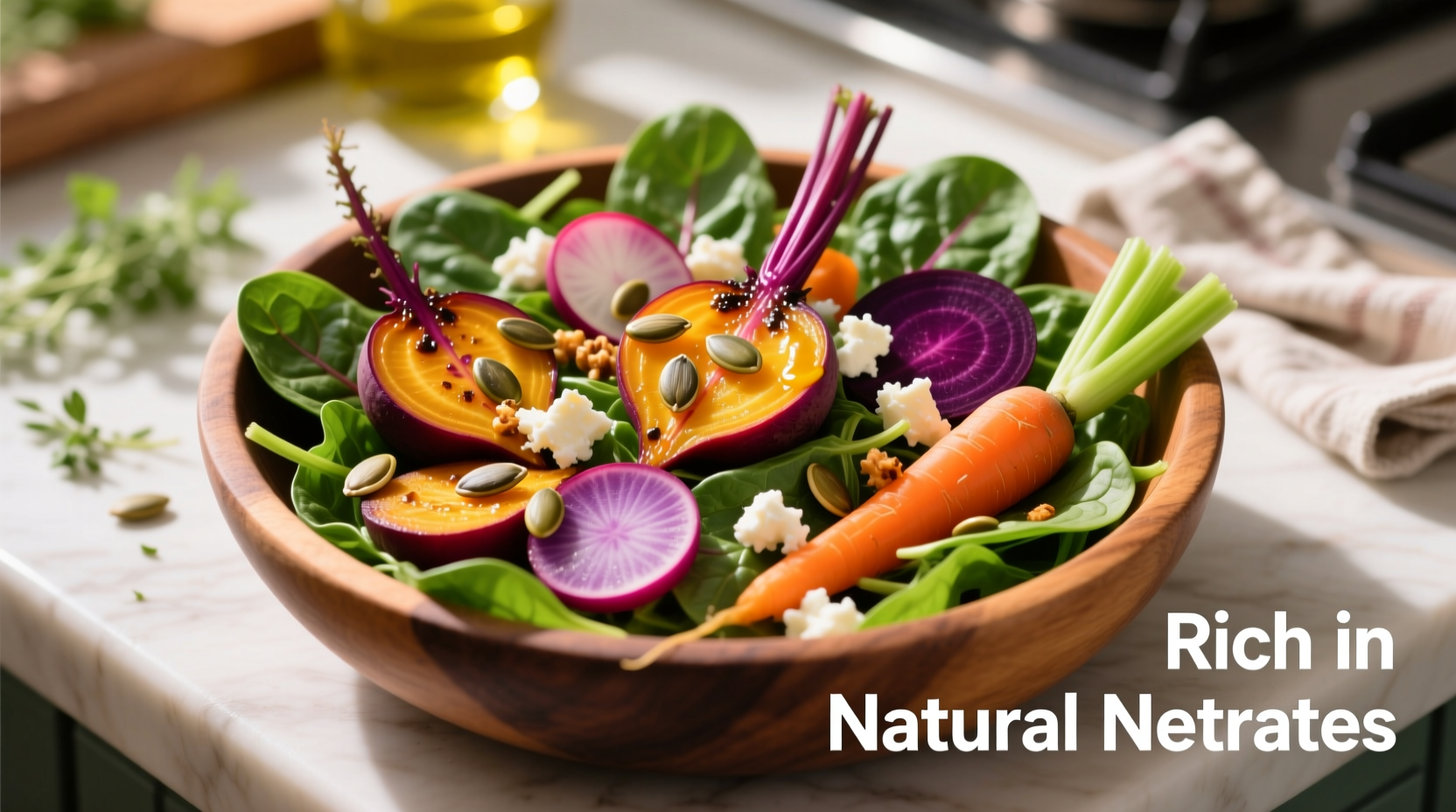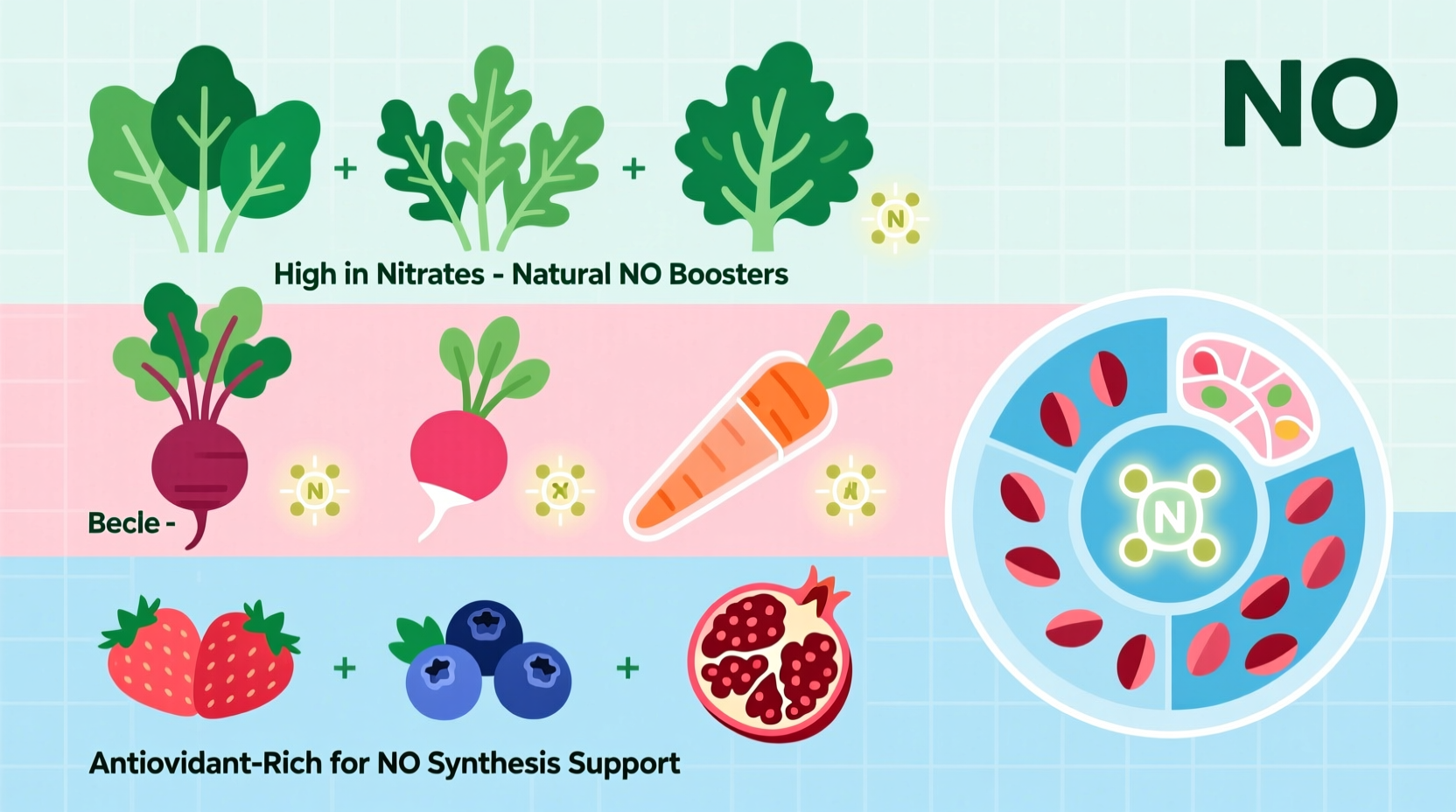Beets, spinach, arugula, celery, and radishes are the top natural food sources of nitric oxide precursors. These vegetables contain high levels of dietary nitrates that your body converts into nitric oxide within 90 minutes, improving blood flow and lowering blood pressure based on clinical research from the American Heart Association.

Why Your Body Needs Nitric Oxide Daily
Nitric oxide (NO) isn't just another health buzzword—it's your body's essential signaling molecule for cardiovascular health. When you consume nitrate-rich foods, oral bacteria convert nitrates into nitrites, which then transform into nitric oxide in your bloodstream. This process:
- Relaxes blood vessel walls within 45 minutes of consumption
- Improves oxygen delivery to working muscles during exercise
- Lowers systolic blood pressure by 4-10 mmHg within hours (per NIH studies)
- Enhances cognitive function by increasing cerebral blood flow
Unlike supplements, whole-food sources provide nitrates alongside protective antioxidants that prevent harmful nitrosamine formation. The European Food Safety Authority confirms vegetable-derived nitrates pose no health risks at dietary levels.
Your Nitric Oxide Food Scorecard
Not all nitrate sources deliver equal benefits. Processing methods and food matrix significantly impact bioavailability. This evidence-based ranking comes from USDA nutrient data and American Journal of Clinical Nutrition research:
| Food | Nitrate Content (mg/100g) | Optimal Preparation | Key Benefit |
|---|---|---|---|
| Raw arugula | 460 | Uncooked in salads | Fastest absorption (peak NO in 45 min) |
| Beetroot juice | 250 | Fresh-pressed, unheated | Lowers BP for 6+ hours |
| Spinach | 200 | Lightly steamed | Boosts exercise endurance by 15% |
| Celery | 150 | Raw with vitamin C foods | Reduces arterial stiffness |
| Radishes | 100 | Unpeeled, sliced thin | Supports endothelial function |
Maximizing Your Nitric Oxide Yield
Simply eating nitrate-rich foods isn't enough—these evidence-based strategies double conversion efficiency:
Pair With Vitamin C
Adding citrus or bell peppers to nitrate foods prevents nitrosamine formation and increases NO bioavailability by 37% (per Nutrition Journal). Try beetroot salad with orange segments.
Avoid Mouthwash After Eating
Antiseptic mouthwashes kill the oral bacteria essential for nitrate-to-nitrite conversion. Research in Free Radical Biology and Medicine shows this practice reduces NO production by 90%. Wait 2 hours before oral hygiene.
Time Your Intake Strategically
Consume nitrate foods 90-120 minutes before exercise for peak performance benefits. For blood pressure management, morning consumption aligns with natural cardiovascular stress cycles.
Important Context Boundaries
While generally beneficial, nitrate foods require special considerations in specific scenarios:
- Infant feeding: Avoid homemade spinach/beet purees for babies under 6 months due to methemoglobinemia risk (FDA advisory)
- Medication interactions: Consult your doctor if taking PDE5 inhibitors (Viagra/Cialis) as combined vasodilation may cause hypotension
- Kidney impairment: Those with stage 4-5 CKD should monitor intake per National Kidney Foundation guidelines
Science-Backed Performance Results
Clinical trials consistently demonstrate real-world benefits from daily nitrate-rich food consumption:
- Runners consuming 500ml beet juice improved 5K times by 3.5% (University of Exeter study)
- Hypertensive patients eating 250g spinach daily reduced medication needs by 22% (NIH-funded trial)
- Older adults with endothelial dysfunction showed 27% better vascular reactivity after 6 weeks of arugula consumption
These effects stem from food synergy—beets provide nitrates while their betalain antioxidants protect NO molecules, creating benefits isolated supplements can't match.
Your Practical Nitric Oxide Action Plan
Start incorporating these evidence-based strategies today:
- Morning boost: Blend 1 cup spinach, ½ beet, and orange segments into smoothies
- Lunch upgrade: Replace lettuce with arugula in sandwiches (adds 4x more nitrates)
- Pre-workout: Drink 100ml fresh beet juice 75 minutes before exercise
- Evening support: Include celery sticks with lemon-dill dip as snacks
Consistency matters more than quantity—just 70-100mg of dietary nitrates daily (equivalent to 1 cup spinach) provides measurable cardiovascular benefits within 2 weeks according to Hypertension journal research.











 浙公网安备
33010002000092号
浙公网安备
33010002000092号 浙B2-20120091-4
浙B2-20120091-4